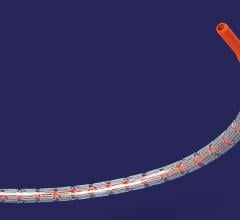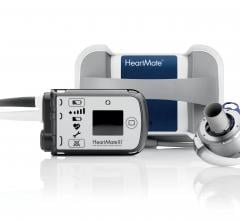May 29, 2018 — The first placebo-controlled trial that looked at how fractional flow reserve (FFR) and instantaneous ...
M.A. MedAlliance SA has raised $37 million to help develop and commercialize the first sirolimus micro-reservoir drug-coated balloon to treat patients suffering from peripheral artery disease (PAD). The Selution DCB is also intended to treat patients with coronary artery disease (CAD), arteriovenous fistulas (AVF) and grafts (AVG) for end-stage renal disease.
Medtronic plc announced the initiation of a U.S. clinical study to assess the safety and efficacy of drug-eluting stents (DES) for the treatment of bifurcation lesions. Bifurcation lesions account for approximately 20 percent of all percutaneous coronary interventions (PCI).[i] The Bifurcation Cohort, part of the RESOLUTE ONYX Post-Approval Study, will include patients with coronary artery disease (CAD) receiving the Resolute Onyx DES in sizes ranging from 2–5 mm in diameter.
Providing exceptional cardiovascular care for patients to achieve the best possible outcomes is the number one goal for ...
May 25, 2018 — Data from the first-in-human study using pulsed electric field (PEF) energy ablate heart tissue in the ...
Abbott announced favorable outcomes from the first 100 patients treated in a global study of its Tendyne Transcatheter Mitral Valve Replacement (TMVR) system. According to Abbott, Tendyne is the first and only mitral replacement valve that is repositionable and fully retrievable to allow for more precise implantation, helping improve patient outcomes. The trial is the largest study of a transcatheter mitral valve replacement device to date. Results at 30 days demonstrated that Tendyne is associated with a significant reduction of mitral regurgitation symptoms and low mortality rates.
Abbott announced it received approval from the U.S. Food and Drug Administration (FDA) for Xience Sierra, the newest generation of the company's Xience everolimus-eluting coronary stent system. Design and technology advances in this generation of the device include features specifically designed for the treatment of complex blockages that now account for up to 70 percent of cases.
Cardiac positron emission tomography (PET) is growing in popularity among cardiologists because it provides the ability ...
Syncope with bifascicular block may be caused by intermittent complete heart block, but competing diagnoses may coexist. A new study tested whether a strategy of empiric permanent pacing (PM) reduces major adverse events more effectively than acting on the results of an implantable cardiac monitor (ICM). Results of the study were presented at Heart Rhythm 2018, the 39th annual scientific sessions of the Heart Rhythm Society (HRS), May 9-12 in Boston.
New clinical study results demonstrate that an investigational algorithm, utilizing the accelerometer signal in the Medtronic Micra Transcatheter Pacing System (TPS) may restore AV synchrony. This would improve cardiac function in patients with sinus rhythm and atrioventricular (AV) block. The results from the MARVEL (Micra Atrial TRacking Using A Ventricular AccELerometer) feasibility study were presented during a late-breaking session at Heart Rhythm 2018, the Heart Rhythm Society's 39th Annual Scientific Sessions, and simultaneously published in Heart Rhythm.
Atrial fibrillation patients who are diagnosed with carotid artery disease face higher risks for developing dementia, according to new research from the Intermountain Medical Center Heart Institute in Salt Lake City.
When performing radiofrequency (RF) ablation to treat cardiac arrhythmia, medical professionals must balance the safety ...
Medtronic plc announced results from a research study demonstrating the feasibility of a novel approach to delivering pacing and defibrillation therapy in which a lead is placed under the sternum (breastbone), outside of the heart and veins. Data from the Acute Extravascular Defibrillation, Pacing and Electrogram (ASD2) study were presented during a late-breaking session at Heart Rhythm 2018, the Heart Rhythm Society's 39th Annual Scientific Sessions, May 9-12 in Boston.
Avinger Inc. announced that the company received 510(k) clearance from the U.S. Food & Drug Administration (FDA) for its next-generation Pantheris Lumivascular atherectomy system. Avinger calls it the first-ever image-guided atherectomy device for the treatment of peripheral artery disease. Lumivascular is the only technology, according to the company, that combines real-time intravascular imaging with highly effective catheters for the treatment of PAD. Peripheral artery disease is projected to affect more than 21 million people in the United States alone by 2020.
At the 2018 EuroPCR Annual Meeting in Paris, Medtronic announced first-ever-data from the SPYRAL HTN-ON MED Study. Initial study results found statistically significant and clinically important blood pressure reductions in hypertensive patients prescribed anti-hypertension medications treated with the Symplicity Spyral renal denervation (RDN) system with no major adverse safety events out to six months.
Change Healthcare Cardiology Hemodynamics is an integrated hemodynamic monitoring system for monitoring vital signs and ...
Medtronic announced on May 23, 2018 that it will discontinue marketing for its SEEQ Mobile Cardiac Telemetry (MCT) System to concentrate support on its Reveal LINQ Insertable Cardiac Monitor (ICM) System.
Guerbet LLC USA announced the upcoming launch of SeQure and DraKon, two novel microcatheters for tumor and vascular aneurysm embolization procedures. The company introduced the microcatheters at the Global Embolization Symposium and Technologies (GEST) 2018 U.S., May 17-20 in Miami.
Abbott has initiated a Class I recall of the HeartMate 3 Left Ventricular Assist System due to a malfunction in the device’s outflow graft assembly. The company said the malfunction may cause the outflow graft to twist and close up (occlusion) over time. Occlusion of the outflow graft can reduce or stop pump flow and set off a persistent low flow alarm in the system. A reduction in pump can lead to serious adverse events such as blood clots and death. The U.S. Food and Drug Administration (FDA) has identified this as a Class I recall, the most serious type of recall.


 May 29, 2018
May 29, 2018
















